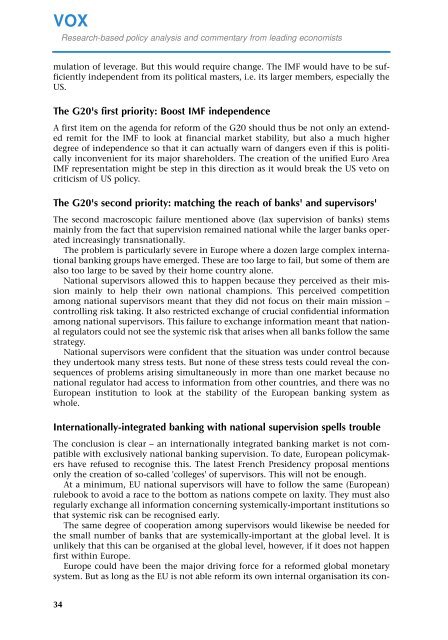What G20 Leaders Must Do To Stabilise our Economy and Fix ... - Vox
What G20 Leaders Must Do To Stabilise our Economy and Fix ... - Vox
What G20 Leaders Must Do To Stabilise our Economy and Fix ... - Vox
You also want an ePaper? Increase the reach of your titles
YUMPU automatically turns print PDFs into web optimized ePapers that Google loves.
VOXResearch-based policy analysis <strong>and</strong> commentary from leading economistsmulation of leverage. But this would require change. The IMF would have to be sufficientlyindependent from its political masters, i.e. its larger members, especially theUS.The <strong>G20</strong>'s first priority: Boost IMF independenceA first item on the agenda for reform of the <strong>G20</strong> should thus be not only an extendedremit for the IMF to look at financial market stability, but also a much higherdegree of independence so that it can actually warn of dangers even if this is politicallyinconvenient for its major shareholders. The creation of the unified Euro AreaIMF representation might be step in this direction as it would break the US veto oncriticism of US policy.The <strong>G20</strong>'s second priority: matching the reach of banks' <strong>and</strong> supervisors'The second macroscopic failure mentioned above (lax supervision of banks) stemsmainly from the fact that supervision remained national while the larger banks operatedincreasingly transnationally.The problem is particularly severe in Europe where a dozen large complex internationalbanking groups have emerged. These are too large to fail, but some of them arealso too large to be saved by their home country alone.National supervisors allowed this to happen because they perceived as their missionmainly to help their own national champions. This perceived competitionamong national supervisors meant that they did not focus on their main mission –controlling risk taking. It also restricted exchange of crucial confidential informationamong national supervisors. This failure to exchange information meant that nationalregulators could not see the systemic risk that arises when all banks follow the samestrategy.National supervisors were confident that the situation was under control becausethey undertook many stress tests. But none of these stress tests could reveal the consequencesof problems arising simultaneously in more than one market because nonational regulator had access to information from other countries, <strong>and</strong> there was noEuropean institution to look at the stability of the European banking system aswhole.Internationally-integrated banking with national supervision spells troubleThe conclusion is clear – an internationally integrated banking market is not compatiblewith exclusively national banking supervision. <strong>To</strong> date, European policymakershave refused to recognise this. The latest French Presidency proposal mentionsonly the creation of so-called 'colleges' of supervisors. This will not be enough.At a minimum, EU national supervisors will have to follow the same (European)rulebook to avoid a race to the bottom as nations compete on laxity. They must alsoregularly exchange all information concerning systemically-important institutions sothat systemic risk can be recognised early.The same degree of cooperation among supervisors would likewise be needed forthe small number of banks that are systemically-important at the global level. It isunlikely that this can be organised at the global level, however, if it does not happenfirst within Europe.Europe could have been the major driving force for a reformed global monetarysystem. But as long as the EU is not able reform its own internal organisation its con-34














